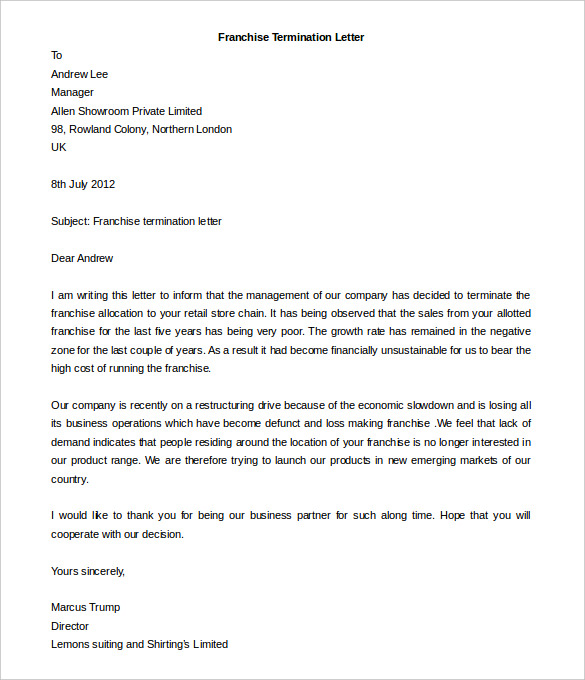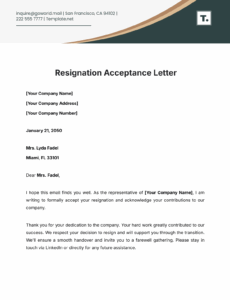In the complex landscape of modern business, the ability to communicate clearly, formally, and effectively is not merely a courtesy—it is a critical operational imperative. This holds especially true when navigating the delicate process of terminating a formal agreement, such as a franchise relationship. A meticulously prepared franchise agreement termination letter sample serves as an indispensable tool, providing a structured framework for conveying vital information with precision and professionalism. This article aims to elucidate the profound importance of such a document, offering insights into its structure, application, and the broader benefits it confers upon all parties involved.
The primary purpose of a robust franchise agreement termination letter sample is to standardize the communication process during what can often be a sensitive and legally significant juncture. It is designed for franchisors, franchisees, legal counsel, and business owners who require a definitive, unambiguous record of termination. By leveraging a well-crafted template, businesses can mitigate risks, ensure compliance with contractual obligations, and preserve professional relationships even as formal ties are severed. This structured approach fosters transparency and minimizes potential misunderstandings, laying the groundwork for a smoother transition for everyone concerned.
The Importance of Written Communication and Professional Documentation
The bedrock of any successful business operation rests on clear, actionable communication, and nowhere is this more critical than in formal documentation. Written communication provides an immutable record, unlike verbal discussions which can be subject to misinterpretation or forgotten over time. In legal and business contexts, every word carries weight, and a formal correspondence ensures that intentions, terms, and conditions are unambiguously conveyed and permanently archived. This clarity is paramount in avoiding disputes and offering recourse should disagreements arise.

Professional documentation, such such as a business letter, elevates the stature of an organization, reflecting its commitment to diligence and integrity. It serves as an official record of interactions, decisions, and agreements, providing a reliable source of truth for all stakeholders. This commitment to detailed record-keeping safeguards a company’s interests, supports legal defensibility, and reinforces its reputation as a credible and responsible entity. Ultimately, well-documented processes protect against ambiguity and foster an environment of trust and accountability.
Key Benefits of a Structured Franchise Agreement Termination Letter Sample
Utilizing a structured template for critical communications like a franchise agreement termination letter sample offers myriad advantages that extend beyond mere convenience. Such a template ensures a high degree of professionalism and consistency across all official correspondence. It guarantees that all necessary information, from contractual references to effective dates, is systematically included, leaving no room for oversight. This uniformity is crucial for legal compliance and for maintaining a consistent brand image in all external communications.
Moreover, a standardized layout significantly enhances clarity. By organizing information logically with clear headings and concise language, the document becomes easily digestible for recipients, reducing the likelihood of misinterpretation. This systematic approach also streamlines the drafting process, saving valuable time and resources that would otherwise be spent on creating a document from scratch. The message template ensures that essential legal and business protocols are followed, thereby minimizing potential liabilities and reinforcing the validity of the termination process.
Customizing This Template for Diverse Purposes
While specifically tailored for franchise agreement termination, the underlying principles of structure, clarity, and professionalism inherent in this type of letter are universally applicable across various formal communication needs. The robust framework of a notice letter can be readily adapted to serve a multitude of purposes beyond its original intent. For instance, the general layout and formal tone can be repurposed for employment termination, where a clear and legally sound document is equally vital for both employer and employee.
Furthermore, this adaptable message template can be customized for general business contract cancellations, vendor agreement terminations, or even formal requests requiring a documented trail. The core elements—recipient and sender details, clear statement of purpose, effective dates, reference to governing agreements, and specific terms of action—remain consistent. By focusing on these fundamental components, any organization can modify the document to create a professional communication for virtually any formal notification, ensuring consistency and legal prudence across their operations.
When is a Franchise Agreement Termination Letter Sample Most Effective?
A precise and professionally drafted franchise agreement termination letter sample is most effective in scenarios where formal, documented notification is legally or contractually mandated, or strategically advisable. It provides an undeniable record of communication, mitigating potential disputes and safeguarding the interests of all parties. Such a document becomes critical in a variety of specific situations:
- Breach of Contract: When either the franchisor or franchisee fails to uphold their obligations as stipulated in the franchise agreement (e.g., non-payment, operational non-compliance, unauthorized brand usage). The letter formally cites the breach and the intent to terminate.
- Mutual Agreement: If both parties amicably decide to conclude the franchise relationship, the letter formalizes this mutual decision, outlining agreed-upon terms for an orderly wind-down.
- Expiration of Term: At the natural conclusion of a fixed-term franchise agreement, if there is no intent to renew. The correspondence serves as official notification that the agreement will not be extended.
- Failure to Meet Performance Benchmarks: Should a franchisee consistently fail to meet pre-defined sales targets, quality standards, or other performance metrics, the letter initiates the termination process based on these documented failures.
- Change in Business Strategy: When a franchisor decides to exit a particular market, discontinue a brand, or significantly alter its business model, requiring the termination of existing franchise agreements.
- Legal or Regulatory Changes: If new laws or regulations render the continuation of the franchise agreement impractical or illegal, requiring formal termination.
- Financial Insolvency: In cases where either party faces bankruptcy or severe financial distress, rendering them unable to fulfill their contractual duties. The letter provides official notice of termination under these circumstances.
In each of these instances, the structured approach provided by the letter ensures that the termination process is handled with the utmost clarity and legal precision, protecting all involved.
Tips for Formatting, Tone, and Usability
The effectiveness of any formal correspondence, including this crucial business letter, hinges not just on its content but also on its presentation and overall usability. Adhering to professional formatting standards is non-negotiable. Always use official letterhead for print versions, ensuring contact details, company logo, and branding are consistent. For digital versions, a clean, readable font (e.g., Times New Roman, Arial, Calibri) in a standard size (10-12pt) is essential. Include a clear date, the recipient’s full name and address, and a specific subject line that immediately identifies the letter’s purpose. Utilize concise paragraphs, bullet points where appropriate, and ample white space to enhance readability.
The tone of the letter must be consistently formal, objective, and professional, reflecting the gravity of the communication. Avoid emotional language, accusatory statements, or subjective opinions. The language should be factual, direct, and unambiguous, adhering strictly to the terms of the original franchise agreement. Maintain a respectful tone, even when detailing breaches or non-compliance, as this helps preserve professionalism and minimizes the potential for further antagonism. Legal counsel should review the correspondence to ensure it aligns with all applicable laws and contractual obligations.
For usability, consider both print and digital versions. Print copies should be signed in blue ink to easily distinguish originals from copies, and sent via certified mail with a return receipt requested, establishing an official record of delivery. Digital versions should be transmitted as secure PDFs to preserve formatting and prevent unauthorized alterations. Ensure that all attachments, such as relevant clauses from the franchise agreement or supporting documentation, are clearly referenced and included. The overall layout should be intuitive, making it easy for the recipient to quickly grasp the key message and locate specific details.
A Reliable and Efficient Communication Tool
In conclusion, the strategic deployment of a well-structured termination notice is more than just a procedural step; it is a testament to an organization’s commitment to professional communication and responsible business practices. This document acts as a safeguard, providing a definitive written request that memorializes the end of a formal relationship with clarity and legal precision. Its meticulous design ensures that all essential information is conveyed accurately and consistently, significantly reducing the potential for disputes and misunderstandings.
By embracing the principles of formal correspondence and leveraging a meticulously crafted message template, businesses can navigate the complexities of agreement termination with confidence and integrity. The inherent value of such a reliable and efficient communication tool extends beyond immediate transactional needs; it upholds an organization’s reputation for thoroughness and fairness. Ultimately, the careful preparation and issuance of such an official record underscore a commitment to clarity, compliance, and ongoing professional conduct in all business dealings.


